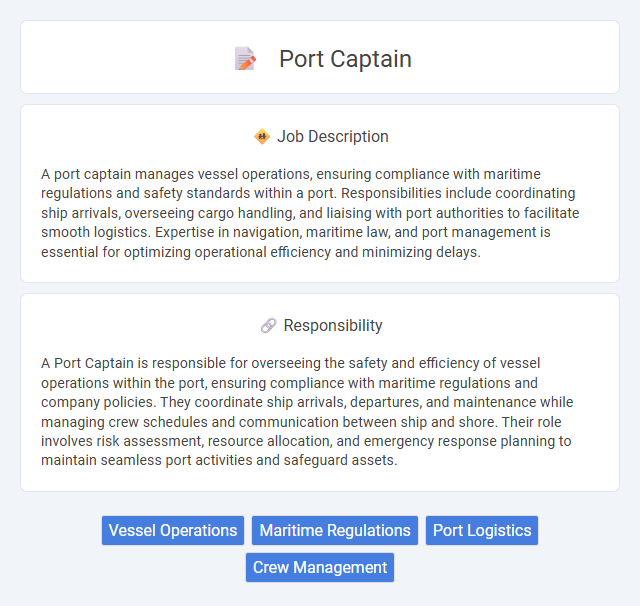
A port captain manages vessel operations, ensuring compliance with maritime regulations and safety standards within a port. Responsibilities include coordinating ship arrivals, overseeing cargo handling, and liaising with port authorities to facilitate smooth logistics. Expertise in navigation, maritime law, and port management is essential for optimizing operational efficiency and minimizing delays.
Individuals who thrive in structured environments and possess strong leadership skills are likely suitable for the role of port captain, as it demands overseeing port operations and ensuring compliance with safety regulations. Candidates with high stress tolerance and excellent problem-solving abilities may find this job fitting due to its dynamic nature and responsibility for managing crews and cargo activities. People who struggle with multitasking or prefer minimal responsibility might find the position challenging or less suitable.
Qualification
A port captain must possess extensive maritime knowledge, including certification as a Master Mariner or Chief Mate, and thorough understanding of international maritime regulations such as SOLAS and MARPOL. Proficiency in ship operations, safety management systems, and crew coordination is essential to ensure efficient port activities and compliance. Strong leadership, communication skills, and experience in vessel scheduling and logistics further qualify candidates for this vital role in maritime operations.
Responsibility
A Port Captain is responsible for overseeing the safety and efficiency of vessel operations within the port, ensuring compliance with maritime regulations and company policies. They coordinate ship arrivals, departures, and maintenance while managing crew schedules and communication between ship and shore. Their role involves risk assessment, resource allocation, and emergency response planning to maintain seamless port activities and safeguard assets.
Benefit
The port captain job likely offers competitive compensation and comprehensive benefits, including health insurance and retirement plans, which may attract experienced maritime professionals. Opportunities for travel and engagement with diverse shipping operations possibly enhance job satisfaction and career growth. This role probably provides a unique blend of leadership experience and technical knowledge, making it valuable for long-term career development in the maritime industry.
Challenge
A port captain likely faces complex challenges involving the coordination of vessel schedules, compliance with international maritime regulations, and management of safety protocols to ensure smooth port operations. Navigating unexpected issues such as weather disruptions, mechanical failures, or security threats probably demands quick decision-making and strong leadership skills. The role may require balancing multiple responsibilities simultaneously, making it a high-pressure yet critical position within maritime logistics.
Career Advancement
Port captains oversee vessel operations and ensure compliance with maritime regulations, positioning themselves for leadership roles within shipping companies or port authorities. Expertise in navigation, safety protocols, and logistics management enhances opportunities for promotion to senior management or executive positions. Continuous professional development and certifications in maritime law and port operations significantly accelerate career growth in this field.
Key Terms
Vessel Operations
Port captains oversee vessel operations to ensure safe and efficient navigation within port waters. They coordinate with pilots, tug operators, and harbor authorities to manage docking, undocking, and vessel movements while adhering to maritime regulations and safety protocols. Their expertise in vessel handling and port logistics minimizes delays and optimizes turnaround times.
Maritime Regulations
Port captains ensure compliance with international maritime regulations such as SOLAS, MARPOL, and ISPS codes, overseeing vessel safety and environmental protection within port operations. They coordinate inspections, certification processes, and enforce local and international laws to maintain security and prevent pollution. Expertise in regulatory frameworks and maritime law is essential for managing ship movements and port facility compliance efficiently.
Port Logistics
Port captains oversee the coordination of port logistics, ensuring efficient vessel scheduling, cargo handling, and compliance with maritime regulations. They manage communication between shipping companies, terminal operators, and customs to streamline operations and minimize turnaround times. Expertise in supply chain management and port infrastructure is essential for optimizing freight flow and maintaining safety standards.
Crew Management
Port captains play a critical role in crew management by coordinating the safe boarding, disembarkation, and welfare of vessel personnel while docked at port. They ensure compliance with maritime labor regulations and facilitate efficient communication between crew members, port authorities, and shipping companies. Effective crew management by port captains directly impacts vessel turnaround times and overall operational safety in port operations.
 kuljobs.com
kuljobs.com